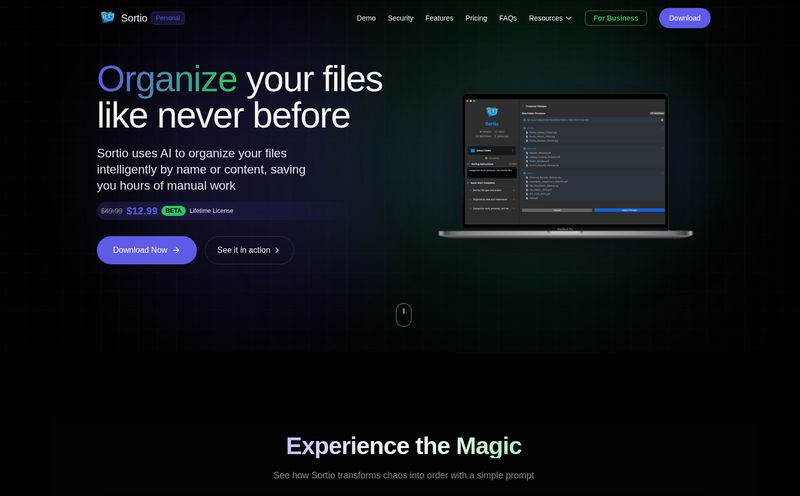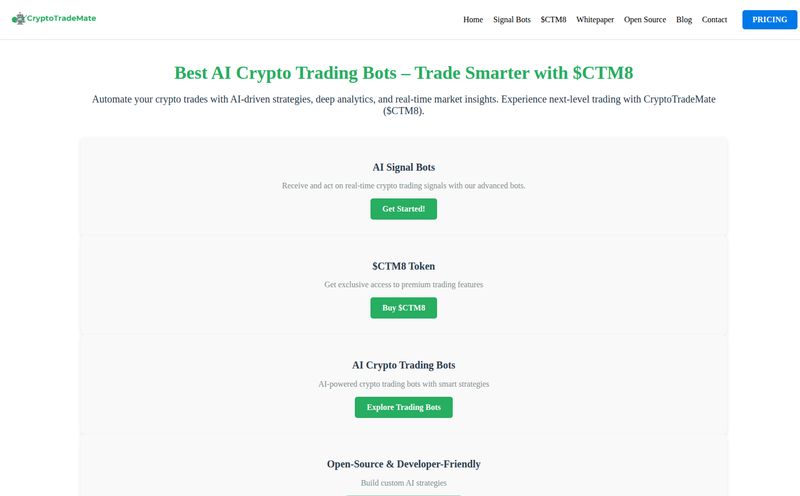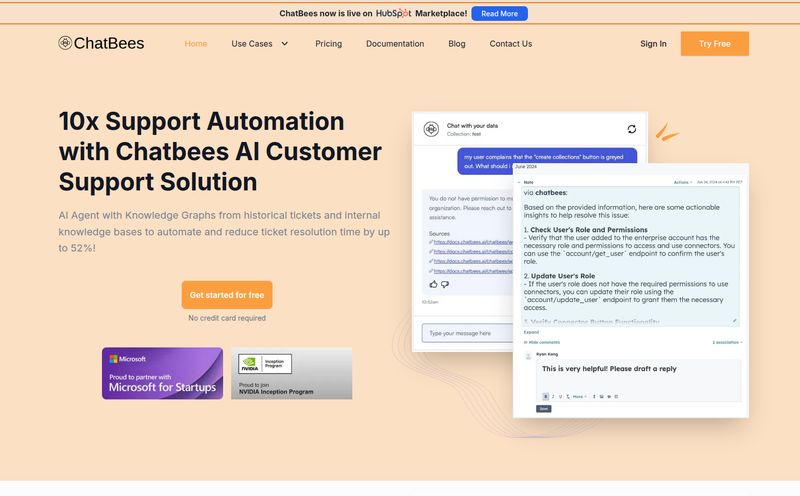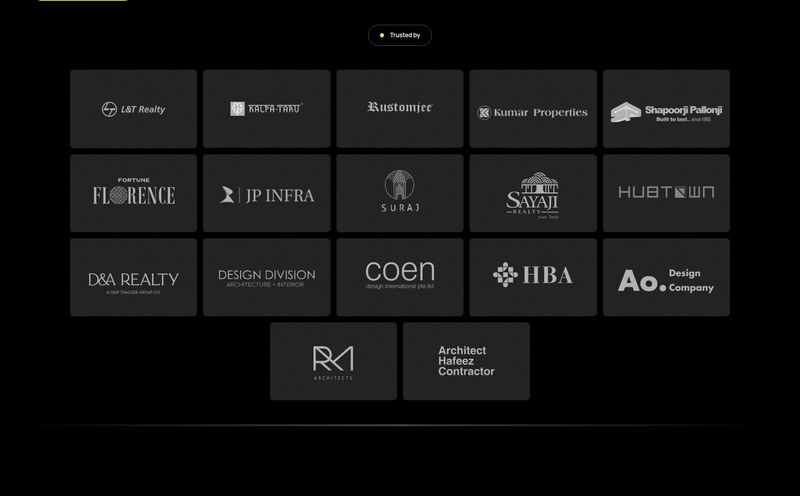The AI space is exploding. Literally. Every week, there’s a new model, a new framework, a new… something. And right in the middle of this beautiful chaos are vector databases, the unsung heroes behind all the cool semantic search and RAG applications everyone's talking about.
Trying to pick one feels a bit like trying to order coffee in a hipster cafe with a 10-page menu. Do I want the single-origin, cloud-hosted, or the open-source cold brew with BM25 foam? It's a lot. I spend my days swimming in SEO, trends, and traffic, and even I get overwhelmed by the sheer volume of choices. We've got Pinecone, Weaviate, Milvus, Qdrant... the list goes on and on.
So when I stumbled upon a tool called Vector DB Comparison, my curiosity was definitely piqued. A simple, free, open-source tool promising to cut through the noise? Okay, I'm listening. Let's see if this thing is actually useful or just more noise.
First Impressions: What is Vector DB Comparison Anyway?
First off, the tool comes from the folks at Superlinked, which gives it a bit of street cred right out of the gate. It’s not just some random weekend project. When you land on the page, there's no fluff. No marketing jargon. No annoying pop-ups. It's just... a table. A glorious, filterable, sortable table.
At its core, Vector DB Comparison is exactly what it says on the tin. It's a massive checklist comparing dozens of vector databases on the features that actually matter to developers and data folks. You can see at a glance which ones are open source (OSS), what license they use, the programming languages they support, and whether they have critical features like filtering, hybrid search, or geo-search.

Visit Vector DB Comparison
It’s clean. It’s straightforward. And frankly, it’s a breath of fresh air. I didn't have to sign up, give away my email, or sit through a demo. I just… got the information. What a concept.
Putting it to the Test: The Good, The Bad, and The Nitty-Gritty
A pretty interface is one thing, but is the information any good? I decided to kick the tires and see how it holds up for someone who needs to make a real decision.
The Features That Actually Matter
This is where the tool really shines for me. The columns aren't just vanity metrics. They're the real questions you'd be asking. For instance, the ‘Hybrid Search’ column is huge. We're moving past pure vector search into a world that blends old-school keyword matching (like BM25) with new-school semantic understanding. Seeing which DBs support this out-of-the-box saves hours of digging through documentation. It’s like having a sommelier's cheat sheet, but for your AI stack instead of a fancy bottle of wine. You can instantly narrow down the choices based on your project's specific appetite for features.
The Open Source Angle and Why I Care
I’ve always been a big fan of open-source projects, so the fact that this is free and open-source immediately caught my eye. It runs on community-verified information. This is both a massive pro and a potential con. The upside is that the data is crowd-sourced from people in the trenches, not just from a marketing team. The information feels more authentic and is updated pretty frequently—the site said it was last updated just a couple of days ago when I checked.
Where It Falls a Little Short
Of course, no tool is perfect. The community-driven model means the information is only as good as the last community update. While it seems current, you should always double-check the official docs before committing to a database. Think of this tool as your highly-informed starting point, not your final destination.
It's also, by definition, limited to the databases on its list. If you're looking for some obscure, brand-new DB that just launched last Tuesday, it might not be here… yet. And I did find a little quirk; I went to look for a pricing page or some other info by clicking around, and I hit a 404 error page. A minor hiccup, and honestly, kinda expected for a free tool that's constantly being updated. Its a small price to pay for the value it provides, and it didn't really detract from the core function.
Who is This Tool Actually For?
So who should be bookmarking this page? I see a few key groups.
First, developers and data scientists who are in the early stages of building a new AI-powered feature. This tool is perfect for creating a shortlist of candidates in minutes, not days. Second, product managers and tech leads who need a high-level overview of the landscape to make strategic decisions. And honestly? Even for people like me—SEOs and digital marketers—who are increasingly working with semantic search technology. Understanding the backbone of modern search helps us create better content and strategies. It helps to know what’s under the hood.
This isn't a deep, enterprise-level evaluation matrix that costs thousands of dollars. It's a quick, powerful, and accessible comparison tool for the 99% of us who just need to get our bearings.
The Big Picture: Vector Databases in the SEO World
For years, we SEOs have been obsessed with keywords. But that world is changing. The rise of vector search is the biggest shift in information retrieval since… well, since Google. It’s all about intent and meaning, not just matching strings of text. This is why I find tools like the Vector DB Comparison so interesting. It’s a peek into the engine room of the next generation of search.
Choosing a vector database with robust filtering and hybrid search capabilities can directly impact how well a site’s internal search function performs, how accurately a recommendation engine works, or how useful a RAG-based chatbot is. This stuff isn't just for Silicon Valley engineers anymore; it's becoming central to creating great user experiences, which is, at the end of the day, what good SEO is all about.
So, What's the Verdict?
I'm genuinely impressed. The Vector DB Comparison tool does one thing, and it does it exceptionally well. It demystifies a complex and crowded market with a simple, elegant solution.
Is it the single source of truth that will make your decision for you? No. But it's an indispensable first step. It won't give you the entire library, but it's the best card catalog you're going to find for free. It gives you the power to walk into that crowded coffee shop, look at the menu, and confidently order exactly what you need.
Frequently Asked Questions (FAQ)
What is Vector DB Comparison?
It's a free, open-source web tool created by Superlinked that provides a detailed comparison table of various vector databases. It helps users filter and sort databases based on features like license, language support, hybrid search, and more.
Is the tool really free?
Yes, it's completely free to use. There's no sign-up or subscription required. Being an open-source project, its value is in the community contribution and its utility.
How accurate is the information?
The information is community-verified and updated regularly. However, as with any open-source project, it's always a good practice to cross-reference the data with the official documentation of the database you're interested in before making a final decision.
Can I add a new vector database to the list?
Since it's an open-source project, there's likely a contribution process, probably through GitHub. You would need to check their project repository for guidelines on how to suggest additions or corrections.
Who is behind this tool?
The tool is provided by Superlinked, a company that focuses on building infrastructure for AI applications, particularly around creating smart vectors for vector databases.
What’s the difference between vector search and traditional keyword search?
Traditional search matches exact keywords in your query to words in a document. Vector search, on the other hand, converts both your query and the documents into numerical representations (vectors) and finds matches based on conceptual similarity and context, not just keywords. It's what allows you to search for "shows about the British royal family" and get results for "The Crown" even if those exact words aren't present.
Conclusion
In a field that's getting more complicated by the day, simple, effective tools are worth their weight in gold. Vector DB Comparison is one of them. It's a fantastic resource that I'll be keeping in my bookmarks and recommending to anyone who asks me where to even start with vector databases. Give it a look; you've got nothing to lose and a whole lot of clarity to gain.
Reference and Sources
- Vector DB Comparison Tool: https://vectordb.superlinked.com/
- Superlinked: https://www.superlinked.com/



